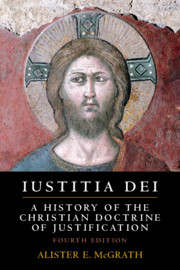Book contents
- Iustitia Dei
- Iustitia Dei
- Copyright page
- Contents
- Tables
- Preface to the Fourth Edition
- Abbreviations
- Introduction
- Part I Justification
- Part II The Middle Ages
- 4 The Nature of Justification
- 5 The Righteousness of God
- 6 The Concept of Grace
- 7 The Human Appropriation of Justification
- 8 Justification and the Two Powers of God
- 9 The Concept of Merit
- 10 Justification and the Sacraments
- Part III Protestantism
- Part IV Catholicism
- Part V The Modern Period
- Conclusion
- A Brief Glossary of Medieval Soteriological Terms
- Works Consulted
- Index
6 - The Concept of Grace
from Part II - The Middle Ages
Published online by Cambridge University Press: 27 January 2020
- Iustitia Dei
- Iustitia Dei
- Copyright page
- Contents
- Tables
- Preface to the Fourth Edition
- Abbreviations
- Introduction
- Part I Justification
- Part II The Middle Ages
- 4 The Nature of Justification
- 5 The Righteousness of God
- 6 The Concept of Grace
- 7 The Human Appropriation of Justification
- 8 Justification and the Two Powers of God
- 9 The Concept of Merit
- 10 Justification and the Sacraments
- Part III Protestantism
- Part IV Catholicism
- Part V The Modern Period
- Conclusion
- A Brief Glossary of Medieval Soteriological Terms
- Works Consulted
- Index
Summary
This chapter continues the exploration of the development of the doctrine of justification during the Middle Ages, focussing on the important concept of grace. Although medieval theologians based their thinking on this significant element of the Christian doctrine of justification on the writings of Augustine of Hippo, it became clear that the idea required further development to engage with the questions being explored at this time. The chapter opens by exploring the increasingly important correlation between grace and the concept of the supernatural, which is expressed in Aquinas’s famous definition of grace as ‘something supernatural within the soul’. The analysis then shifts to the distinction between actual and sanctifying grace. Although this distinction is implicit within Augustine’s theology of grace, it lacked the conceptual precision necessary to engage certain questions. This is also true concerning the distinction between operative and co-operative grace, which became increasingly important in Aquinas’s theological analysis. The chapter concludes by exploring one of the most distinctive themes in thirteenth-century theology: the role of supernatural habits of grace in justification. What factors led to its introduction, and why did Ockham and the via moderna criticise this? This analysis establishes a significant continuity of argument between the via moderna and Luther on the relational aspects of grace.
- Type
- Chapter
- Information
- Iustitia DeiA History of the Christian Doctrine of Justification, pp. 103 - 117Publisher: Cambridge University PressPrint publication year: 2020

